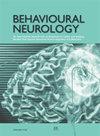Clinical Factors Predicting Voluntary Driving Cessation among Patients with Parkinson's Disease
IF 2.7
4区 医学
Q2 CLINICAL NEUROLOGY
引用次数: 0
Abstract
Factors that influence the decision of voluntary driving cessation in patients living with Parkinson's disease (PD) are still unclear. We aimed to reveal the factors affecting the decision of voluntary driving cessation in patients with PD. This hospital-based cross-sectional study recruited consecutive outpatients with PD. Data on sociodemographic and clinical characteristics and medication use were collected from the patients using semistructured interviews. Cognitive function was evaluated using the Japanese version of the Montreal Cognitive Assessment (MoCA-J). We excluded patients with dementia or motor impairment (Hoehn − Yahr stage > 3). We divided the patients into two groups, with and without voluntary driving cessation (D: driver; RD: retired driver), and conducted investigations using multivariate logistic regression analyses. Of the 40 patients, 8 (20.0%) voluntarily retired from driving. Patients who decided on driving cessation had a higher prevalence of freezing of gait (FOG) (D vs. RD, 25.0% vs. 87.5%; P = 0.001) and tended to have lower scores for attention in the MoCA-J (D vs. RD, 5.0 ± 1.2 vs. 4.1 ± 1.4; P = 0.086). Multivariable analysis showed that FOG was independently associated with driving cessation (odds ratio: 14.46, 95% confidence interval: 1.91–303.74). FOG was associated with voluntary driving cessation in patients with PD without dementia or severe motor impairment. Physicians should consider providing extensive social support to maintain patients' mobility and independence, especially if the patients have these clinical factors.预测帕金森病患者自愿停车的临床因素
影响帕金森病患者自愿停止驾驶决定的因素尚不清楚。我们旨在揭示影响帕金森病患者自愿停止驾驶决定的因素。这项基于医院的横断面研究招募了连续的帕金森病门诊患者。使用半结构访谈从患者中收集社会人口统计学、临床特征和药物使用的数据。认知功能使用日本版的蒙特利尔认知评估(MoCA-J)进行评估。我们排除了患有痴呆症或运动障碍的患者(Hoehn−Yahr 阶段>3)。我们将患者分为两组,有和没有自愿停止驾驶(D:驾驶员;RD:退休驾驶员),并使用多元逻辑回归分析进行调查。在40名患者中,8人(20.0%)自愿退出驾驶。决定停止驾驶的患者步态冻结(FOG)的发生率较高(D与RD,25.0%与87.5%;P=0.001),并且在MoCA-J中的注意力得分较低(D与。RD分别为5.0±1.2和4.1±1.4;P=0.086)。多变量分析显示,FOG与驾驶停止独立相关(优势比:14.46,95%置信区间:1.91-303.74)。在没有痴呆或严重运动障碍的PD患者中,FOG可与自愿驾驶停止相关。医生应该考虑提供广泛的社会支持,以保持患者的行动能力和独立性,尤其是在患者有这些临床因素的情况下。
本文章由计算机程序翻译,如有差异,请以英文原文为准。
求助全文
约1分钟内获得全文
求助全文
来源期刊

Behavioural Neurology
医学-临床神经学
CiteScore
5.40
自引率
3.60%
发文量
52
审稿时长
>12 weeks
期刊介绍:
Behavioural Neurology is a peer-reviewed, Open Access journal which publishes original research articles, review articles and clinical studies based on various diseases and syndromes in behavioural neurology. The aim of the journal is to provide a platform for researchers and clinicians working in various fields of neurology including cognitive neuroscience, neuropsychology and neuropsychiatry.
Topics of interest include:
ADHD
Aphasia
Autism
Alzheimer’s Disease
Behavioural Disorders
Dementia
Epilepsy
Multiple Sclerosis
Parkinson’s Disease
Psychosis
Stroke
Traumatic brain injury.
 求助内容:
求助内容: 应助结果提醒方式:
应助结果提醒方式:


